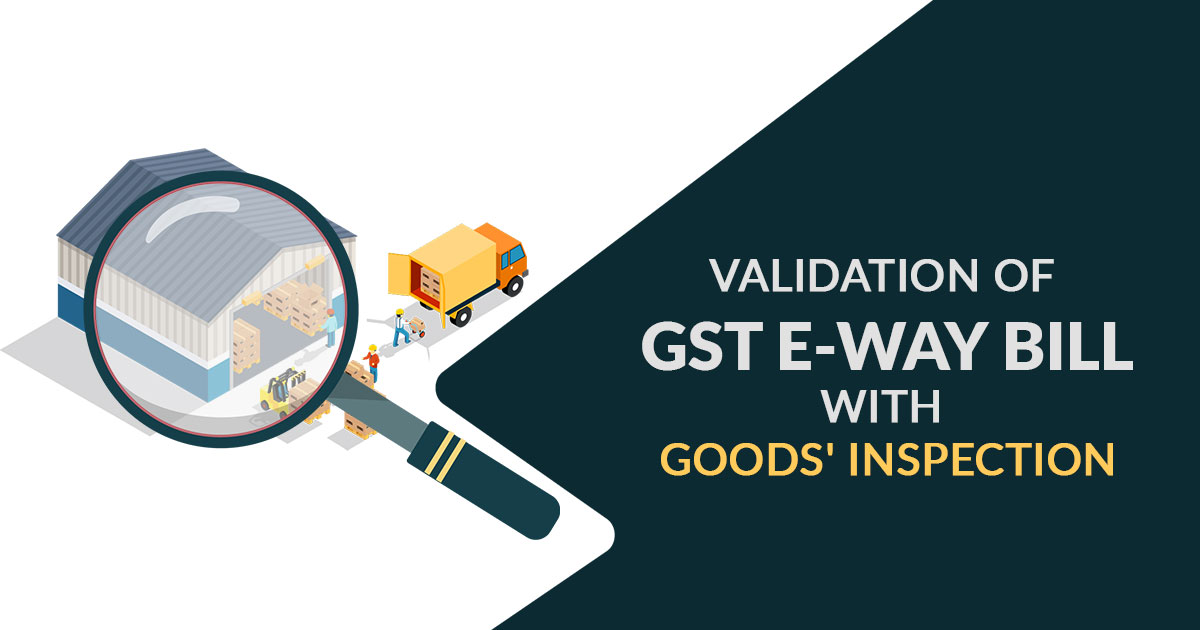
The major usage of the e-way bill is to ensure the smoother goods movement at the check post. When goods are ready to move from one place to another then the transporter needs to verify that the mentioned things are in place:
- E-way Bill/number
- Invoice Copy
This article elaborates on the investigation of various processes which are engaged in the transportation of goods from one place to another. The procedures which are elaborated here are the preferences of GST e way bill verification, detention & inspection of goods in transit.
By an Officer, Intercept and/or Inspect
When the goods are in transit, a proper office can intercept or inspect any good carrier. The same might either be intercepted for the e-way bill verification purposes or the goods inspection. Moreover, towards the e-way bill verification process, the officer might validate all the documents that are on the transporter, perception of e-way bills and invoices, for others. But it should be remembered that the officer would not do any other form of the physical inspection of goods when one is conducted already in a state or UT.
GST Eway Bill Required Documents
The officer shall furnish these documents on the interception:
- Part A of form GST EWB-03 summary report (Happens within 24 hours of the inspection)
- The final report in Form GST EWB-03 Part B. the same would be furnished within 3 days of the inspection.
What will happen if the Transporter is unable to supply the Documents while processing the Verification of GST E Way Bill
The mentioned below steps can be taken by the proper officer these are:
Step 1: Record the statement of the transporter in Form GST MOV-01.
Step 2: Towards the inspection of goods in the second GST MOV form, an order is being issued.
Step 3: After the finish of the proceedings, a report in Form GST MOV-04 would get updated.
What Happens Document Discrepancy Found/Not Found
If no mismatch or glitches are found in the documents while conducting the examination, an order in Form GST MOV-05 would be passed to release the vehicle and goods. The process stated above must run parallel. Moreover, the process must get finished in 3 days from the order of the inspection.
While verifying and inspecting the goods, if the officer revealed any discrepancy the officer would take the below-mentioned actions:
- Pass detention with the help of Form GST MOV-06.
- A notice that will express the tax and penalty imposed via Form GST MOV-07.
Read Also: Easy Guide to Integrate GST E-Way Bill with Vahan e-Portal
Owners’ Action Toward the Order
Post obtaining the notice to furnish the subjected tax and penalty, the seized owner might:
- Accept the tax and penalty
- Dispute the tax and penalty
Effects of No Payment of Taxes & Penalties
When there is a failure to furnish the charges or the officer sees another try has been made to tax theft then he or she will:
- Serve a notice asking to seize the goods and the vehicle. The same would tell you about the tax amount, levied a penalty, along with the fine in place of seizing that is required to be furnished. The same amount needs to be paid within a duration of 3 months.
- Prior to passing the final order, the officer needs to provide the assessee with a chance to be heard.
Recommended: Gen GST E Way Bill Software: A Complete E Waybill Solution For Suppliers & Transporters
Final Passing Order via Form GST MOV-11 & MOV-09
The final order would be passed in Form GST MOV-11 and the form GST MOV-09 shall get taken after the process of the inspection of goods found any form discrepancies. A summary of the orders would be uploaded on the common portal. When the vehicle is seized, the vehicle’s title with that of the goods is assigned to the Central Government. On the payment of the fine, the title would be released. Towards the aforementioned case, a temporary id would be made for making the payments for an unregistered taxpayer. There are several kinds of forms and their precise use would be notified to you. These are described as:
| Name of the Form | What is its use? |
|---|---|
| GST MOV-01 | Statement of the owner or driver who is the vehicle in charge. |
| GST MOV-02 | An order for physical verification and the inspection of goods, the conveyance, or the documents. |
| GST MOV-03 | Order for extension of time after three days for inspection |
| GST MOV-04 | A report of physical verification |
| GST MOV-05 | This is a release order |
| GST MOV-06 | An order of detention |
| GST MOV-07 | Notice that determines the penalty and tax amount |
| GST MOV-08 | A bond for the provisional release of goods and/or conveyance |
| GST MOV-09 | An order requiring the tax and the penalty |
| GST MOV-10 | A notice for the seizure of goods |
| GST MOV-11 | An order of seizure of goods and/or conveyance and payment of the applicable taxes, fines, and penalties |
As the mentioned process are still running in its initial stage, its advantages are yet not be obtained. It will be noticed how the same operations/process would diminish the waiting and compliance time and indeed lessens the paperwork.